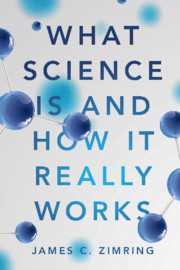Book contents
- What Science Is and How It Really Works
- What Science Is and How It Really Works
- Copyright page
- Dedication
- Contents
- Acknowledgments
- Introduction
- Part I
- 1 The Knowledge Problem, or What Can We Really “Know”?
- 2 Adding More Building Blocks of Human Reasoning to the Knowledge Problem
- 3 Holistic Coherence in Thinking, or Describing a System of How Humans Reason and Think
- Part II
- Part III
- About the Author
- Index
1 - The Knowledge Problem, or What Can We Really “Know”?
from Part I
Published online by Cambridge University Press: 04 July 2019
- What Science Is and How It Really Works
- What Science Is and How It Really Works
- Copyright page
- Dedication
- Contents
- Acknowledgments
- Introduction
- Part I
- 1 The Knowledge Problem, or What Can We Really “Know”?
- 2 Adding More Building Blocks of Human Reasoning to the Knowledge Problem
- 3 Holistic Coherence in Thinking, or Describing a System of How Humans Reason and Think
- Part II
- Part III
- About the Author
- Index
Summary
Francis Bacon, one of the luminaries of modern science, is thought to have said that “knowledge is power.” Since Bacon made that statement, it has become abundantly clear that humans have a very distinct and difficult “knowledge problem.” There is a fundamental defect in how we come to know anything, and while this is recognized as a problem, the depths of the problem are seldom appreciated and even less frequently discussed. At first glance such a statement may seem ridiculous. What is the problem in saying someone knows something? I know where I am and what I’m doing. I know the names and faces of my friends, family, and acquaintances. I know how to drive a car, how to cook (at least somewhat), and how to pay bills. In fact, just to navigate the tasks of daily life one has to “know” a great number of things.
Information
- Type
- Chapter
- Information
- What Science Is and How It Really Works , pp. 19 - 43Publisher: Cambridge University PressPrint publication year: 2019
